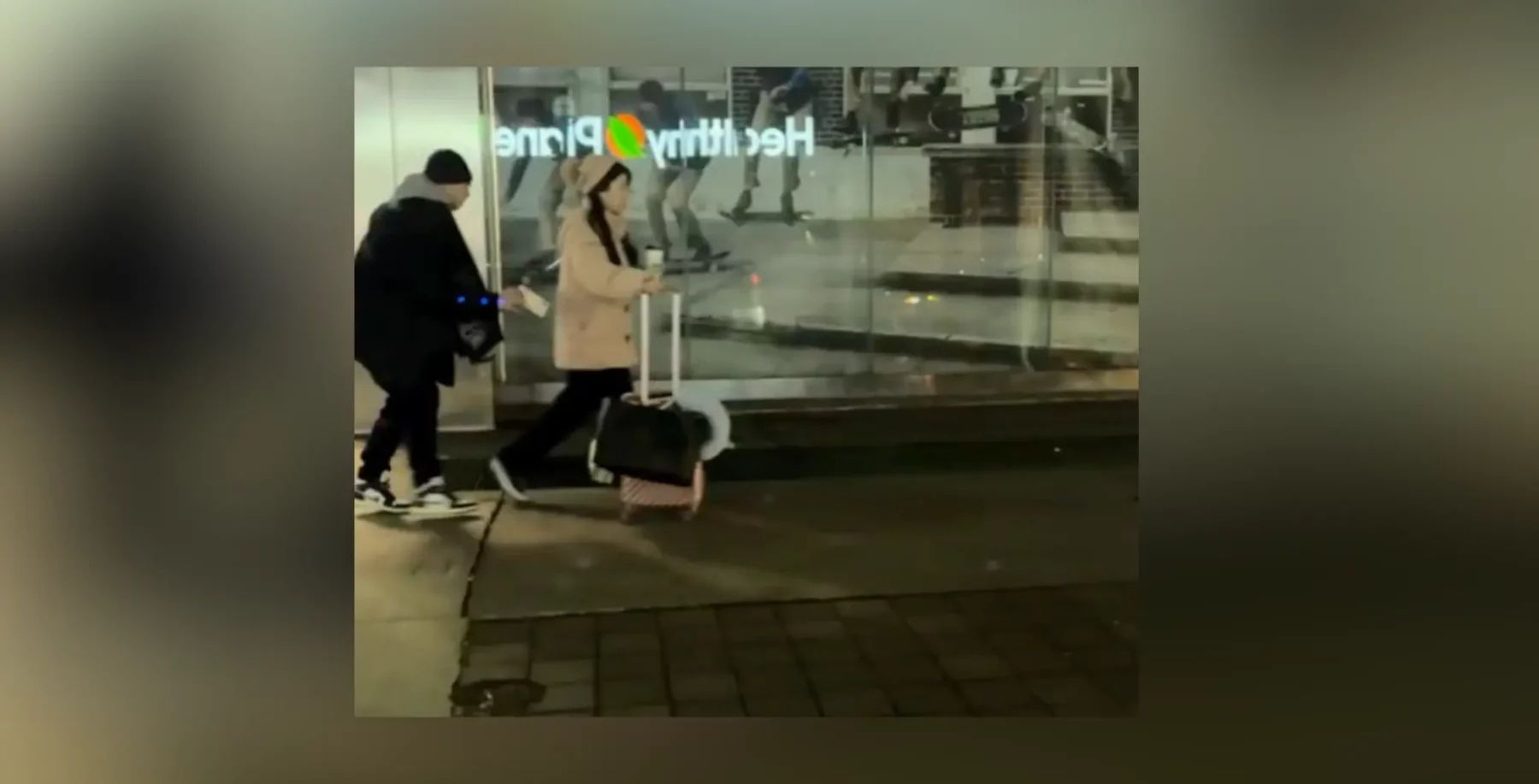
If you walked down Roncesvalles in late November, you may have seen something that made your heart sink: storefront after storefront with windows papered over. The same words, over and over, in big red letters: “FOR LEASE.”
Thankfully, it was just a campaign by the Roncesvalles Village Business Improvement Area. The message: Support local businesses, no matter where you live, or you might not have them much longer.
Local businesses need support. That’s true every year, but especially now. The COVID-19 pandemic has ravaged Toronto’s once-vibrant city streets and many small business owners are doing everything they can to keep the lights on. Many have put in countless extra hours, planning and pivoting any way they can.
To make matters worse, just before holiday shopping season – the most profitable time of year for many small businesses – the city went back into lockdown. Once again, restaurants are relying on takeout and delivery, and hair and beauty salons have closed. While big-box stores can open as long as they sell items deemed essential, shops that aren’t selling groceries or food are mostly limited to curbside pickup and delivery.
It’s not all on you. Businesses also want help from all levels of government: a longer and more strident commercial eviction moratorium, wider-reaching rent relief, financial supports and a safe “small-business-first retail strategy” that allows up to six masked and distanced people (three employees, three shoppers) in a business at a time.
But there is a lot you can do to support local. This is a time to reaffirm and strengthen communities and neighbourhoods, even if you can’t gather in-person. Step one: Clear your Amazon wish list. Make the effort to buy gifts and goods at mom-and-pop shops.
“The decision to support local is so much more than just supporting a business,” says Adam Langley, vice-chair of the Roncesvalles Village BIA. “It typically means you’re supporting local creators and designers, you’re supporting labour practices in line with your beliefs. It spins around to ethically-sourced products that don’t come from conflict areas, there isn’t the environmental impact of 10 Amazon delivery trucks going up and down the street.
“It’s easier than you think. It just takes a small shift in effort.”
The imperialistic dominance of Amazon, Uber Eats and other corporate online platforms means shopping local likely won’t be quite as convenient, but it’s getting easier. During this pandemic, many initiatives and directories have made it easier. Here are some tips.
Go window shopping
Just because you can’t go into stores doesn’t mean you can’t shop their windows. The best way to see what’s in your neighbourhood is to mask up and hit the streets. We all need to get out of the house anyway.
Creative displays are not limited to the Bay (which raised some eyebrows by exploiting a loophole to open for in-store shopping on the first day of lockdown).
In Cabbagetown, local artists have put up eight displays for a program called Deck The Holidays. The Yonge & St. Clair neighbourhood has used its storefronts for a socially distanced scavenger hunt. The Junction’s Window Wonderland uses augmented reality to unlock art by pointing your phone camera at local storefronts.
Some local storefronts have put up QR codes or websites that direct you to their online inventories. Some, like Coal Miner’s Daughter (a store that features mainly Canadian fashion and accessories designers and makers) are packing displays with regularly updated new arrivals and gift ideas so you can check the window like it’s your email.
BIAs are your friend
Toronto’s neighbourhoods are represented by Business Improvement Areas, city boards that advocate for local business and property owners. Throughout the pandemic, their websites and Instagram accounts have become valuable resources on neighbourhood news, special deals and services and pandemic pivots.
Many also have robust directories, so you can find all the spots you can support in your own area even if you can’t or don’t want to pound the pavement yourself. Here’s a full list of local BIAs from the umbrella association TABIA. You can go from there.
Shop at Not-Amazon
Just before the latest lockdown started, local social media manager Ali Haberstroh grabbed a $10 URL and plopped in a Google spreadsheet to collect user-submitted spots doing curbside pickup and delivery. Since then, Not-Amazon has gone mini-viral, ballooning to over 500 local businesses and counting. It’s now a fully designed website, like an online mall directory of independent businesses throughout the city and online.
That’s not the only local business directory floating around. Website togotoronto.com is collecting restaurants doing delivery and takeout and Instagram account @SupportLocal.TO is collecting more local businesses. Artisan market Toronto Market Company has pivoted online to let you order from more than 90 local vendors. Facebook group Palz Helping Zone has a big thread with users’ favourites and likely so do a few of the people you follow on Twitter.
Use “support local” hashtags
Even if you’re making an effort to window shop, there’s going to be significantly less foot traffic this season. And many businesses that launched during COVID are mostly virtual anyway. They rely more than ever on word-of-mouth, and a lot of business is done directly on Instagram.
“Support local” hashtags really help. Try things like #ShopLocalTO, #ShopLocalToronto and #SupportLocalTO. It’s another way to “window shop.” And if you have a favourite business in the city, don’t keep it to yourself. Follow, share and use the hashtags yourself. If there’s a newsletter, subscribe and forward. Leave a five-star Yelp review. Anything you can do to get the word out.
Buy gift cards
Want to wait until you can sit and eat inside a restaurant? No one knows when that will be, but you can buy a gift card in the meantime. Or if you just like a shop and know you’ll want to shop there later, a gift card is a little cash infusion at a time when shops really need it. They make good presents too. Slip one in a holiday card, maybe even one made by a local artist.
Try one of the city’s new bottle shops
One of the hidden silver linings of the pandemic has been the loosening of alcohol rules. Restaurants and bars can now sell alcohol for takeout and delivery. And that’s led to an explosion of new makeshift bottle shops at spots like BarHop Brewco. Even if you can’t grab a seat with your local barfly, you can stop into your favourite bar and buy a six-pack to enjoy at home. Or grab a bottle of wine at a restaurant like Bar Vendetta, many of which you can’t find the LCBO.
The city’s best local breweries offer free local delivery with a minimum order. Grab brews from spots Left Field, Collective Brewing or Godspeed and you can get affordable cases of beer, including some special cans and bottles you can’t get at the Beer Store. Or order from specialty wine services like Grape Crush.
Let’s hope the new booze rules stick around after the pandemic.
Order food directly
The Ontario government is finally proposing a legislated cap on commissions for local restaurants from delivery apps like Uber Eats, Door Dash and Skip the Dishes. But even that 15-20 per cent fee can eat into a restaurant’s profit margins.
The best thing you can do is order from restaurants directly and pick up the order yourself. You can also use an app like Ritual, which lets you order ahead for pick up. But even with the city’s deal to remove fees for that app, the best thing is to call ahead and pay when you get there. (When it comes to other shops, curbside is generally a more business-friendly service than delivery too.)
Some restaurants do their own delivery, but many still rely on major delivery apps so you don’t necessarily want to delete them. Since the pandemic started, some restaurant-friendly apps have also sprung up. Check out Ambassador or Chowbus (an app that specializes in Asian restaurants) or Toronto delivery co-op localEats.TO. You can also find some good eats on Facebook Marketplace.
Don’t wait for Friday or Saturday night
Roger Yang, owner of vegan restaurants Avelo and Pizzeria Du and founder of the aforementioned localEats, tweeted out some tips of his own.
“Support your local restaurants by ordering on off-peak days,” he says. “Typically, most people order on Fridays and Saturdays, mostly from 5:30-7:30. It can be about 3x as busy as weekdays. This can make it stressful for workers, especially with lower staffing now. It’s also more difficult for restaurant managers, since they have to try to schedule more for those few hours, and less the rest of the time.
“Bonus, you’re more likely to get more attentive service!”
Don’t forget to tip!
In August, I wrote about how some local restaurants are trying to do away with the tipping model in an effort to pay everyone a living wage. But in the meantime many people rely on tips – it’s not just an extra bonus, it’s part of their wage.
There is no table service during lockdown, but you can still tip on delivery and takeout. Many people don’t think you need to tip on takeout since you aren’t getting the same service, but it doesn’t mean that people aren’t relying on tips any less – or doing any less work to deliver your order.
Shipping: optional?
One other thing you might not know: Even if shipping is free, you can still add that amount. Artist-led Roncesvalles shop Likely General owner Brooke Manning has been a champion of local business during this pandemic, working 12-hour days to fulfill orders and as a pickup point for food justice organization Sundance Harvest.
“Stores like mine often offer free shipping on orders over a certain amount,” Manning tells NOW over Instagram. “We understand shipping can be very expensive, and we wish to offer our customers something in return for taking the time to shop with us. Because of this, we often operate at a deficit when it comes to shipping. Likely has been lucky in that some customers see they are offered free shipping, but choose to select the payment option instead. We’ve especially seen this happen during COVID.
“It’s not something we’ve ever asked for or put out into the world, but wow… is it thoughtful when customers empathize with small stores like mine and do this if they are financially able to.”
Richard Trapunski discusses this story, and other ways Torontonians can support local businesses, in the latest episode of the NOW What podcast, available on Apple Podcasts or Spotify or playable directly below:
NOW What is a twice-weekly podcast that explores the ways Torontonians are coping with life in the time of coronavirus. New episodes are available Tuesdays and Fridays.












